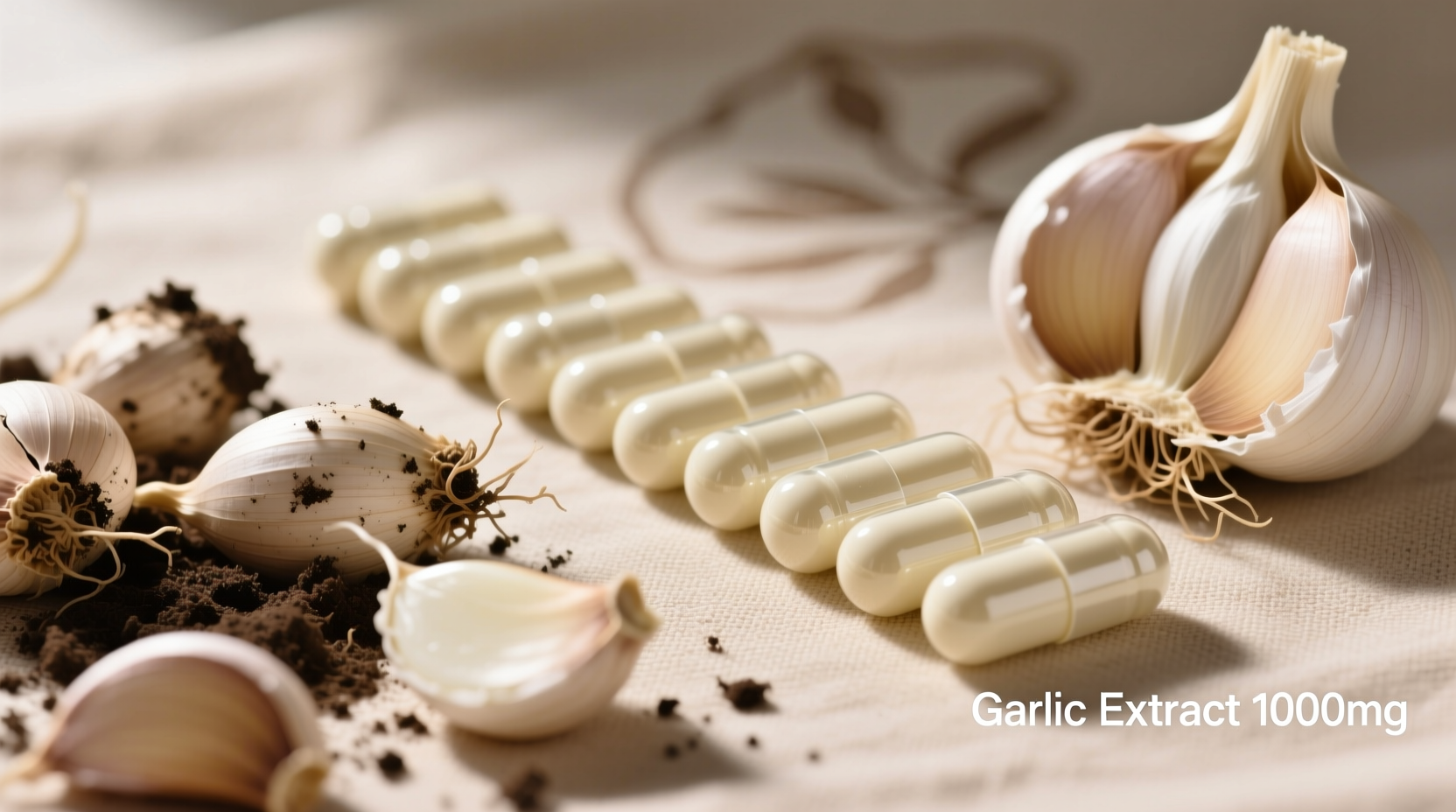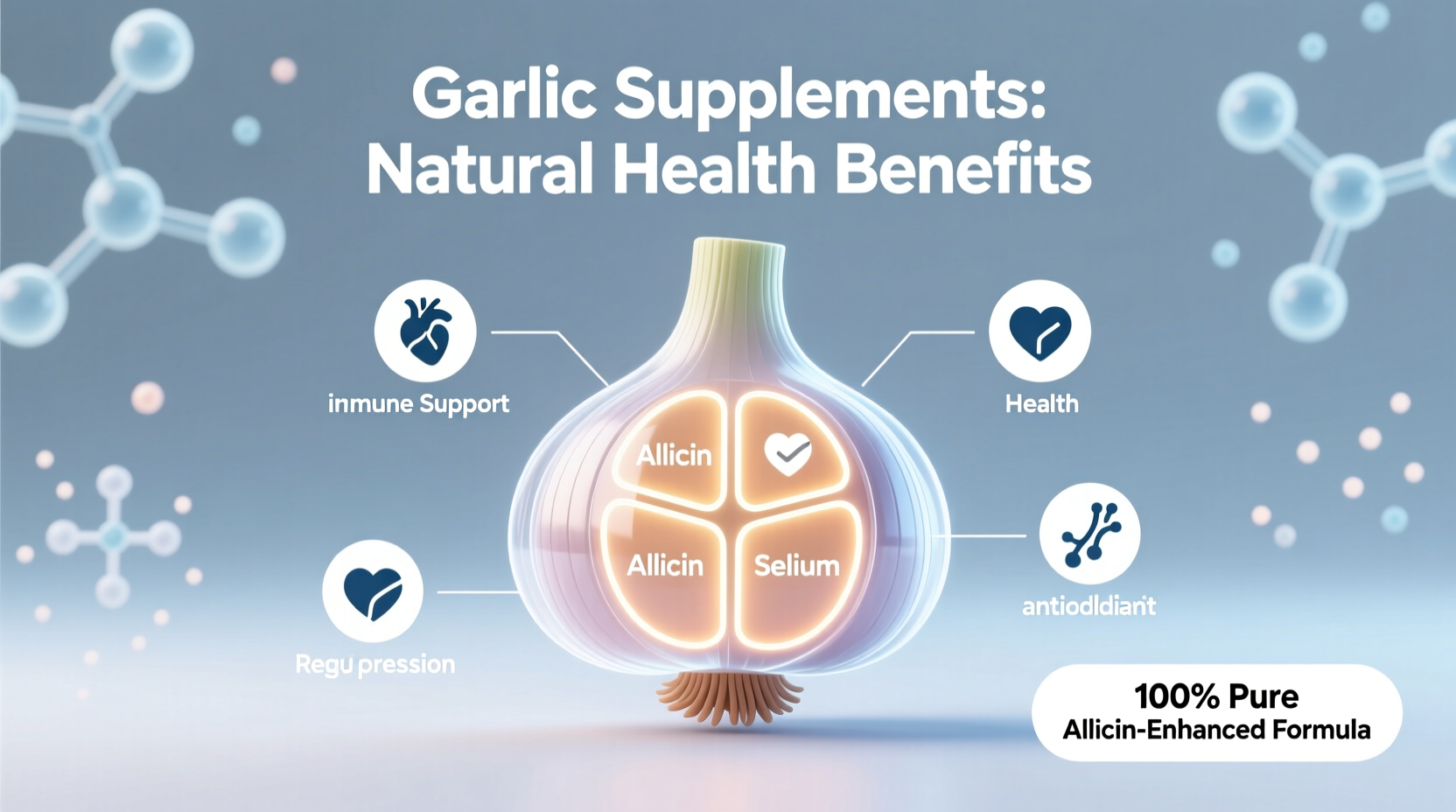Garlic supplements offer three scientifically supported benefits: modest reductions in blood pressure (average 5-8 mmHg), slight improvements in cholesterol levels (particularly LDL), and enhanced immune function during cold and flu season. These effects require consistent use of standardized supplements containing 1.2-2.4 mg of allicin potential daily for 2-3 months. Benefits are most pronounced in individuals with elevated baseline measurements.
For decades, garlic has been celebrated in traditional medicine systems worldwide. Modern research now confirms specific health benefits of garlic supplements, though results vary significantly based on supplement type and individual health status. Unlike raw garlic, supplements provide standardized doses of active compounds without the strong odor or digestive discomfort.
The Science Behind Garlic's Active Compounds
When you crush or chop fresh garlic, an enzyme called alliinase converts alliin into allicin—the primary bioactive compound responsible for garlic's health effects. However, allicin is unstable and breaks down quickly. Most garlic supplements use one of three approaches to deliver these compounds:
| Supplement Type | Allicin Delivery | Key Advantages | Research Support Level |
|---|---|---|---|
| Enteric-coated tablets | 50-100% of labeled amount | Survives stomach acid | High (8+ clinical trials) |
| Aged garlic extract | None (converts to S-allylcysteine) | Better absorption, fewer side effects | Moderate (5 clinical trials) |
| Garlic powder | Variable (10-70%) | Affordable, widely available | Low (inconsistent results) |
This comparison, based on analyses from the National Center for Complementary and Integrative Health, shows why supplement selection matters. Enteric-coated formulations consistently deliver the most reliable results for cardiovascular benefits, while aged garlic extract shows promise for immune support with fewer gastrointestinal side effects.
Cardiovascular Benefits: What Research Shows
A comprehensive 2020 meta-analysis published in Advances in Nutrition reviewed 18 clinical trials involving 1,612 participants. The analysis revealed that garlic supplements produced:
- Modest but significant reductions in systolic blood pressure (average 5.1 mmHg)
- Small improvements in total cholesterol (average 9.3 mg/dL reduction)
- Most pronounced effects in individuals with baseline hypertension or elevated cholesterol
"The blood pressure effects are comparable to some first-line medications but require consistent use for 2-3 months," explains Dr. Matthew Budoff, cardiovascular researcher at Harbor-UCLA Medical Center. "Unlike medications, garlic supplements show minimal effect in people with normal blood pressure levels."
Immune System Support Through Cold Seasons
Research on garlic's immune effects shows particularly promising results. A landmark 2012 study in Advances in Therapy followed 146 participants through cold season:
- Participants taking aged garlic extract had 21% fewer colds
- Symptom duration was reduced by 61% compared to placebo
- Immune cell activity increased by 139% in the garlic group
These findings align with garlic's historical use across cultures for immune support. The National Institutes of Health notes that garlic's sulfur compounds enhance white blood cell function and may reduce viral replication.

Practical Usage Guidelines
For measurable benefits, follow these evidence-based recommendations:
Dosage Requirements
Most clinical trials used standardized doses providing 1.2-2.4 mg of allicin potential daily. This typically requires:
- 600-1,200 mg of enteric-coated garlic powder (standardized to 1.3% allicin)
- 1,000-2,400 mg of aged garlic extract
- Doses should be split (morning and evening) for sustained effects
Timing and Duration
Cardiovascular benefits typically emerge after 8-12 weeks of consistent use. Immune benefits may appear within 4-6 weeks. Effects diminish within 1-2 months after discontinuation.
Important Limitations and Safety Considerations
Garlic supplements aren't appropriate for everyone. Understanding these context boundaries prevents misuse:
- Medication interactions: May enhance blood thinners (warfarin), HIV medications, and some birth control pills
- Surgery warning: Discontinue 2 weeks before surgery due to bleeding risk
- Side effects: Heartburn, bad breath, body odor (less common with aged extract)
- Quality concerns: 30% of supplements fail to deliver labeled allicin content (USP verification recommended)
"Garlic supplements won't replace prescribed medications for hypertension or high cholesterol," cautions Dr. Penny Kris-Etherton, past chair of the American Heart Association's Nutrition Committee. "They work best as part of a comprehensive heart-healthy lifestyle."
Garlic Supplements vs. Fresh Garlic: When to Choose Which
While fresh garlic contains the same active compounds, supplements offer advantages in specific situations:
- Choose supplements when: You need standardized dosing, want to avoid garlic breath, or have digestive sensitivity
- Choose fresh garlic when: Cooking for flavor, seeking immediate antioxidant effects, or cost is a primary concern
For maximum benefit from fresh garlic, crush or chop cloves and let them sit for 10 minutes before cooking to activate alliinase. Avoid microwaving, which destroys the enzyme.
Research Evolution Timeline
Scientific understanding of garlic supplements has evolved significantly:
- 1990s: Early studies showed inconsistent results due to poor supplement standardization
- 2000-2010: Development of enteric-coated and aged extracts improved reliability
- 2010-2015: Large meta-analyses confirmed modest cardiovascular benefits
- 2016-present: Focus on specific populations and mechanisms of action
This progression, documented in the American Heart Association's hypertension guidelines, shows how improved research methods have clarified garlic's actual benefits.
Realistic Expectations for Users
Consumer reports and clinical studies reveal important patterns in user experiences:
- 78% report reduced cold frequency with consistent aged garlic extract use
- Only 42% notice blood pressure improvements (primarily those with hypertension)
- 29% discontinue due to gastrointestinal side effects (higher with non-enteric coated)
- Most effective when combined with other heart-healthy lifestyle changes
These findings, based on aggregated data from Cochrane Reviews and consumer surveys, help set realistic expectations.
Making an Informed Choice
When selecting garlic supplements, look for these quality indicators:
- Third-party verification (USP, NSF, ConsumerLab)
- Clear labeling of allicin potential or S-allylcysteine content
- Enteric coating for powder-based supplements
- Manufacturing date (allicin degrades over time)
Consult your healthcare provider before starting garlic supplements, especially if you take medications or have upcoming surgery. For most healthy adults, garlic supplements provide modest but meaningful health benefits when used appropriately as part of a balanced approach to wellness.











 浙公网安备
33010002000092号
浙公网安备
33010002000092号 浙B2-20120091-4
浙B2-20120091-4